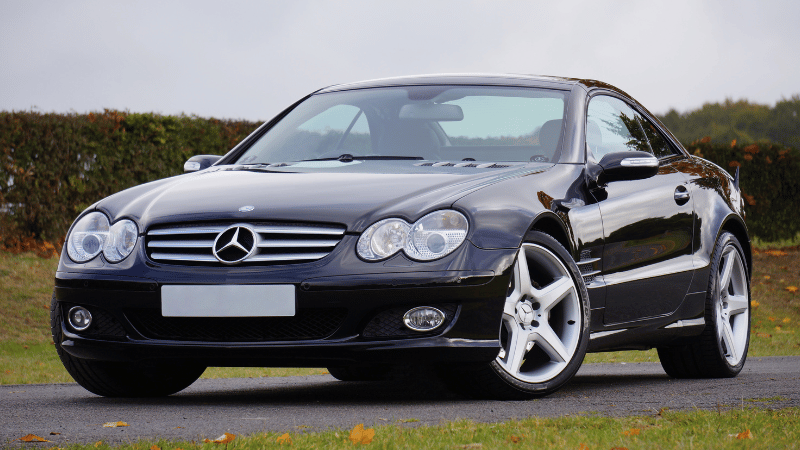Categories
How to Get a Car Loan in 5 Steps

So you want to buy a new car? Excellent - we can help!
At Clifton Private Finance we have the knowledge and the connections needed to get you on the road in your dream vehicle.
Here's a broad outline of how to get a car loan:
Stage 1: Before Choosing a Car
- Check Your Credit Score: Review and improve your credit score using free online tools (e.g., Experian, Equifax). Pay debts on time, avoid maxing out credit, and register on the electoral roll.
- Save for a Deposit: Prepare a deposit, either in cash or through part-exchange of your current car.
- Plan Repayments: Ensure you can afford monthly payments, insurance, fuel, maintenance, and road tax.
- Select Your Car: Identify the type of car you need based on fuel type, size, and features.
Stage 2: Explore Financing Options
- Hire Purchase (HP): Pay a deposit and monthly payments to eventually own the car.
- Personal Contract Purchase (PCP): Low monthly payments with a large optional balloon payment at the end.
- Personal Contract Hire (PCH): Lease a new car with no ownership option, including maintenance options.
- Unsecured Loans: Use a personal loan to buy the car outright, with flexible use of funds.
- Credit Cards: Consider zero-interest credit cards for small purchases, but manage payments carefully.
Stage 3: Compare Deals
- Shop Around: Avoid dealership-preferred options; explore independent brokers and comparison sites.
- Consult Specialists: Work with a car finance expert to secure better rates and terms.
Stage 4: Application
- Prepare Documents: Gather proof of identity, income, and car details.
- Submit Application: Apply with confidence if your credit score is strong and finances are in order.
- Provide a Deposit: Have cash or your old car (for part exchange) ready to secure the deal.
Stage 5: Managing Payments
- Set Up Direct Debits: Ensure payments are made on time to avoid penalties and credit impacts.
- Communicate Issues: Contact the lender if you face financial difficulties or exceed mileage limits.
- Save for Balloon Payment: For PCP agreements, save monthly for the final payment if you plan to own the car.
- Maintain the Car: Keep the car insured and well-maintained to meet contract requirements.
Let's go through these steps in more detail. But first, a quick overview of car finance and how it works.
And to get an independent comparison of the best rate you could achieve for your car purchase:
What is a Car Loan? An Overview of Car Finance
A car loan - more properly called car finance - is a type of funding designed to help you purchase a car (or other vehicle, such as a van or even a tractor). Car finance uses a few key methods to make it as efficient as possible:

1 - Car finance uses the car as security
One of the biggest single factors in getting a loan and determining the costs of that loan (interest rates and fees) is risk. Risk is the lender’s primary concern, because they like lending to people in low risk situations - that’s like making easy money, and dislike lending to people in high-risk situations, for obvious reasons.
All dedicated car finance uses this method of security. If you ever hear of asset-based lending or asset finance, then it means using an asset (something valuable) as security on the loan.
Common asset-based car finance options include:
- Personal Contract Purchase (PCP)
- Personal Contract Hire (PCH)
There are ways to finance a car that don’t involve this security, and we will cover those in this article, but they represent wider-ranging loan and finance options that are not specific only to car purchases. These include unsecured bank loans and credit cards, among others.

2 - Car finance cares about depreciation
Depreciation is the measure of how your car loses value over time. A brand new car is worth more than one that has been driven around, and so the older the car and the more it has been used, the lower its market value.

3 - Car finance is based on your creditworthiness
The other significant factor in determining your eligibility for a car loan is your financial standing and credit history. It is another metric by which the finance provider can determine risk.
However, having a poor credit score does not necessarily mean a car loan is unobtainable. Because car finance has the car for collateral, your credit history has less of an impact than it does for other types of loan.
At Clifton Private Finance, we can help you get a suitable car finance agreement even if your credit rating is poor. We have established relationships with specialist providers of car finance for bad credit applicants and can use our in-depth knowledge of the UK car finance marketplace to find a loan for you.
With that said, it is still to your advantage to improve both your credit score and your affordability, by lowering outgoings as much as possible and paying off debt prior to applying for car finance.

4 - Car finance is often offset by a deposit
An initial payment or deposit is a lump sum you pay at the beginning of your car finance arrangement to lower the remaining amount of borrowing and greatly reduce the risk for the finance company.
Because the finance provider considers repossession as a final option in reclaiming their money, the value the car will get upon its repossession and the amount of the loan that will pay off, is important to them.
Time is also a factor, as they are keen to sell the car as quickly as possible, typically being willing to sell fast at a lower price than wait for a better offer.
This means, for example, a car valued at £30,000 might actually recoup only £28,000 to secure a quick sale. If the finance company have loaned you the full £30,000 at this point, they are conceivably £2,000 out of pocket.
And, as we covered earlier, lower risk means better rates and a greater chance of acceptance.
In short, this means that while not all companies will insist on a deposit and there are plenty of car finance options with zero upfront payment, opting to pay a chunk as a deposit will improve your car finance terms and ultimately save you money.

How to Get a Car Loan - Stage One: Before the Car
Now that we fully understand what makes a car loan a car loan, what needs to be done to get one? Let’s look at the preparation stage:
Sorting Out Your Credit Score
Before even beginning to think about a car loan, it’s worth taking a good look at your credit score and seeing what can be done about it.
This is a lot easier now than it was even as recently as five years ago, as now credit rating agencies (CRAs) are obliged to give you access to your score online and for free.
You can do this once a month and it doesn’t affect your rating to check; this gives you the space to make changes and see how those changes affect your rating.
The website or app is also likely to provide plenty of advice on how you can directly improve your score, though it comes down to these basic factors:
- Pay your direct debits and other obligations on time - especially credit cards.
- Don’t use up all your credit - maxing out overdrafts and credit cards all the time is a bad idea.
- Make sure you are properly registered on the electoral roll - this helps show you are a full-time resident of the UK.
- Clear as much debt as possible - obvious but true.
- Avoid making ‘hard’ credit checks - applications for credit cards or other finance (including car finance) leaves a mark; best to leave it until you know you’re in a good position.
A few months of good money management can make a huge difference to a credit score, so if yours is in a bad way, perhaps put off your car finance for a little while and spend that time improving it.
Saving For a Deposit
As stated earlier, if you can make a substantial initial payment, it’s better in the long run if you do. This doesn’t have to be in terms of actual cash.
Obviously, the state of your car and its age will make a huge difference to its value, but almost anything you’ve been driving around has some impact.
Plan for Repayments
Part of being in the position to get car finance is knowing you can repay it without a problem. Car finance contracts are quite strict, so it’s best to not sign up for one if you are not confident you can afford it.
Remember, your monthly repayments are not the only outgoing - you also need to pay insurance, fuel, any maintenance (though this is likely to be small if you’re getting a new car), and road tax (though not in the first year).
Start Choosing a Car
The most fun part of course, is thinking about what you want in a car. Think about your realistic requirements, from the type of fuel, make and model, through to what boot space or number of seats you need.


How to Get a Car Loan - Stage Two: Choosing Finance
There are many different types of finance you can use to pay for your car.
These include both asset-based and unsecured finance options. We’re including some brief details for each in this article, with links to in-depth features on each for you to learn the full breakdown of each specific car finance product.
Hire Purchase (HP) and Conditional Sale (CS)
There’s very little difference between hire purchase and conditional sale, so we tend to just think of them both as hire purchase. Read our article on conditional sale to find out what those fine nuances are!
HP is a car finance agreement designed for those who want eventual car ownership. It involves paying a deposit (usually 10%) and then monthly repayments that cover the remaining cost of the car, plus interest, over 24 to 60 months. During the agreement, the car is still owned by the finance company, but once the total is paid off, it becomes yours.
Hire purchase involves:
- A significant (10%) upfront payment, or deposit.
- Spread, equal monthly repayments.
- Eventual ownership of the car.
- Larger monthly costs compared to other types of finance due to the goal of ownership.
- Full responsibility for maintenance and insurance.
- Very few restrictions.
- Good for both new and used cars, of all values.
To learn more about hire purchase, look to these articles:
Personal Contract Purchase (PCP)
Personal contract purchase is a tailored arrangement that aims for low monthly repayments and flexibility.
PCP offsets its low ongoing cost with a large optional balloon payment.
If you choose to make the balloon payment (also called the GMFV or guaranteed minimum future value) then the car becomes yours, or you can opt to return the vehicle and take out a new PCP plan on a brand new car, effectively upgrading your car every few years.
PCP contracts tend to be between 24 and 36 months.
Personal contract purchase involves:
- Flexible initial payments, with larger payments offsetting monthly costs.
- Low-as-possible monthly payments focused on just covering depreciation.
- A final balloon payment for optional car ownership at the end of the contract.
- Full responsibility for maintenance and insurance.
- Restrictions on mileage and wear and tear.
- Available for both new and used cars, for car values of ~£5,000+.
- Flexible end-of-contract options including full ownership, vehicle upgrade, and closing contract with no obligations.
To explore PCP agreements in-depth, why not read some of these?:
Personal Contract Hire (PCH)
Close to a long-term rental agreement rather than finance for total car ownership, personal contract hire offers a worry-free, hassle-free option for people who want to have a car but don’t want the headache of having to deal with its problems.
PCH is only available for brand-new or nearly-new vehicles, offering a way to access the latest driving technology for a reasonable monthly outlay.
There’s no option for you to purchase the car, but at the end of the contract you can upgrade to a new vehicle with ease. Like PCP, PCH can be obtained with very low (and sometimes, zero) upfront deposit payments, but for cost-efficiency a sizeable deposit significantly reduces ongoing costs.
Personal contract hire involves:
- Worry-free car use.
- Reasonable monthly payments.
- Integrated maintenance contracts.
- Restrictions on mileage and wear and tear.
- Available for new cars only.
- No eventual ownership.
Unsecured Loans
Not a car finance product, but nonetheless a viable way to get funding to buy a car, a standard unsecured personal loan can provide the money you need to buy a car outright.
It’s unlikely that an unsecured loan will offer a better interest rate than one of the dedicated car finance alternatives, such as HP or PCP, however it is more flexible, potentially providing extra funds that can be used to pay for insurance, as well as any other needs.
Unsecured loans involve:
- Flexible lump-sum capital directly to your bank account.
- Set monthly payments for up to seven years.
- Interest rates based on credit history.
- Able to be used for car purchases as well as any other use.
- Total car ownership.
- No repossession clause (note however, that if you fail to make payments, later debt recovery may include seizure of your assets, including your car).
Credit Cards
Because many credit cards offer extended interest free periods, clever credit card use can make it possible to purchase your car and pay for it over time without ever incurring any interest at all.
While many people selling used cars are happy to take payment on credit card, private sellers may be unable to, while larger dealerships may put a limit on the amount that can be paid with credit cards.
It’s important to check this before relying on credit cards for your car purchase.
Credit cards involve:
- Opportunity for zero-interest finance.
- Large financial flexibility.
- Total car ownership.
- Need for good money management to avoid debt spiral.


How to Get a Car Loan - Stage Three: Finding the Best Deal
Getting a good deal on your car finance requires some forethought. Almost all dealerships and many used car garages will have partnerships with car finance providers that they will offer to you when you buy the car.
This convenience means it’s very easy to just agree to what’s being handed to you on a plate and not think about shopping around - it’s also the fastest way to get a deal that’s acceptable but not really as good as it could be.
It really does pay to have your car finance thought about and prepared before you go and look at the car, as it’s less likely you’ll be swept along in the salesperson’s enthusiasm - plus, you’ll know what you can afford realistically.
At Clifton Private Finance, we have a dedicated team of car finance specialists who will work on your behalf to find the best deals in car finance for you. No push to get the partner that your dealership is working with, instead a chance to get a superior deal that saves you money month-on-month.

How to Get a Car Loan - Stage Four: Application
Making your car finance application is not too long a process.
You will need the relevant paperwork regarding your personal identity, your finances, and the car itself, so it’s worth preparing that before sitting down to complete the application. Many car finance deals can be secured quickly, especially if you have a strong credit rating and the information is straightforward.
If you are putting forward a deposit or initial payment, have that ready to go right away - that includes any current vehicle you’re planning to offer in part exchange.

How to Get a Car Loan - Stage Five: Paying For It
Car finance secured, and the car is now in your possession - congratulations! But the job’s not done. For the next few years, you are going to be paying for the vehicle.
Some tips include:
- Prioritising the direct debit - Car finance agreements are quite strict and missing payments will impact your credit rating as well as your relationship with the finance provider. Keep on top of them and make sure the money is there to make any direct debit go through straight away.
- Communicate - If there’s anything wrong, from the fact you’re struggling with a payment, to some damage done to the car, or passing the annual mileage limit, don’t sit silently. Contact the finance provider right away and discuss the situation with them. They’ll be able to help, and the more open you are, the easier it is to reach the right solution.
- Put aside a little for any balloon payment - If you have a PCP contract with an optional final balloon payment that you plan to pay, then it’s worth putting a little aside to cover it each month. Of course, if you miss a month every now and then, there’s no harm done, but when it comes to making that final payment it’s a lot easier if there’s a savings account with the money ready, even if it’s not the full amount.
- Don’t crash - Seriously, don’t, it’s bad for your health as well as the state of the car! Even more seriously though, don’t worry too much if you do have an accident as that’s what insurance is for. Stay calm, communicate with both the insurers and your car finance company, and everything will be fine.
Getting The Best Car Loans with Clifton Private Finance
If you’re looking for car finance, give us a call. We have experts ready to help you get a car, from a ten year old family SUV to a shining new EV.
We can help you understand your options so that you make an informed decision that saves you money and gets you the car you really want. Contact us today to get one step closer to your dream vehicle.
.png)










